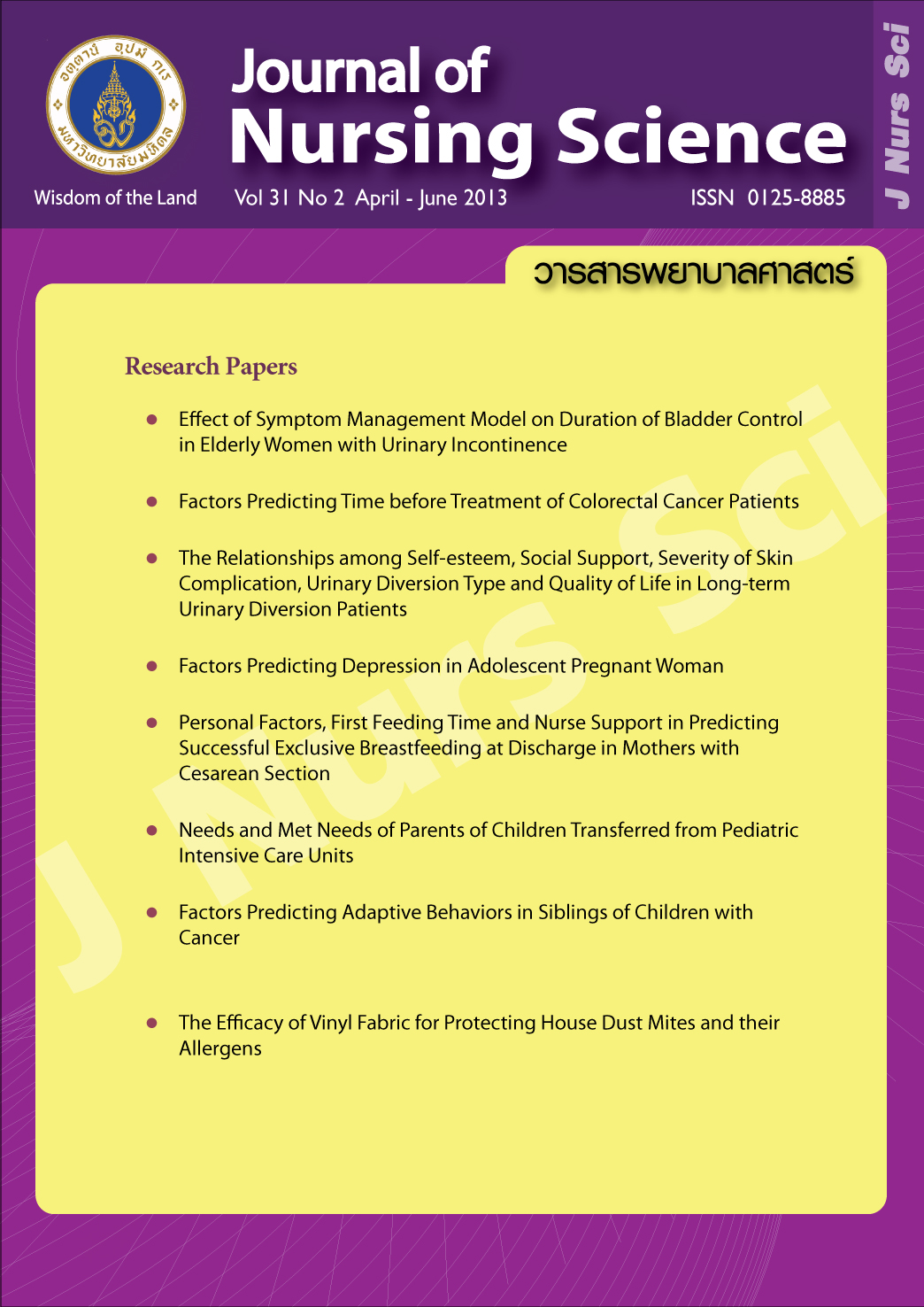Effect of Symptom Management Model on Duration of Bladder Control in Elderly Women with Urinary Incontinence
Main Article Content
Abstract
Purpose: To determine what urinary incontinence effects elderly women living in a community and their methods of management; and to study the effect of symptom management model on duration of bladder control.
Design: Mixed methods study.
Methods: Thirty female aged ≥ 60 years old living in a community and had urinary incontinence categorized into three groups (stress, urge, and mixed incontinence) with 10 each were recruited into the study. Instruments included 1) interviewing questionnaires asking personal information, effects of urinary incontinence on life, and methods of management 2) urination recording form 3) a manual for pelvic floor exercise for female with urinary incontinence. The symptom management model was implemented through four times of group meeting using empowerment techniques. Descriptive statistics, t-test, and content analysis were used for the data analysis.
Main findings: Nearly half (46.7%) of the subjects had moderate severity of urinary incontinence. Urinary incontinence had little up to moderate effects on elderly women’s daily life. The most used management methods were similar among the three groups: going to the toilet more frequently, drinking less water, staying at home, and staying close to the toilet. Content analysis revealed that the entire subject lacked knowledge of cause and symptom management. After participating in the symptom management model, the groups of urge and mixed incontinence had significantly longer duration of holding urination (p < .001).
Conclusion and recommendations: This study suggests that the symptom management model in this study could help elderly women manage their urinary incontinence effectively. Application of this model with certain modification to fit the context of health service centers and communities is encouraged.
ผลของรูปแบบการจัดการอาการต่อระยะเวลาการกลั้นปัสสาวะไม่อยู่ในผู้สูงอายุสตรี
จันทนา รณฤทธิวิชัย, รัชนี ศุจิจันทรรัตน์, สมจินต์ เพชรพันธุ์ศรี, ถนอมขวัญ ทวีบูรณ์, พิชัย ศุจิจันทรรัตน์, นิตยา มีหาดทราย
บทคัดย่อ
วัตถุประสงค์: เพื่อศึกษาผลกระทบและวิธีการจัดการอาการกลั้นปัสสาวะไม่อยู่ของผู้สูงอายุสตรีในชุมชน และศึกษาผลของการใช้รูปแบบการจัดการอาการกลั้นปัสสาวะไม่อยู่ต่อระยะเวลาการกลั้นปัสสาวะ
รูปแบบการวิจัย: วิธีการวิจัยเชิงผสมผสาน
วิธีดำเนินการวิจัย: กลุ่มตัวอย่างเป็นผู้สูงอายุสตรีในชุมชน อายุ 60 ปีขึ้นไปที่มีปัญหากลั้นปัสสาวะไม่อยู่ชนิดเล็ดชนิดราดและชนิดเล็ดราด กลุ่มละ 10 คน รวม 30 คน เครื่องมือในการวิจัยประกอบด้วย 1) แบบสัมภาษณ์เกี่ยวกับข้อมูลส่วนบุคคล ผลกระทบจากการกลั้นปัสสาวะไม่อยู่ การจัดการแบบแผนชีวิต 2) แบบบันทึกการถ่ายปัสสาวะประจำวัน และ 3) คู่มือการปฏิบัติตนในผู้สูงอายุสตรีที่มีปัญหากลั้นปัสสาวะไม่อยู่ ดำเนินการใช้รูปแบบการจัดการอาการโดยผ่านการประชุมกลุ่ม 4 ครั้ง ร่วมกับการเสริมสร้างพลังอำนาจ วิเคราะห์โดยสถิติพรรณนา การทดสอบค่าที และการวิเคราะห์เนื้อหา
ผลการวิจัย: ร้อยละ 46.7 ของกลุ่มตัวอย่าง มีอาการกลั้นปัสสาวะไม่อยู่ระดับปานกลาง และได้รับผลกระทบจากอาการนี้ในระดับเล็กน้อยถึงปานกลาง วิธีการจัดการอาการกลั้นปัสสาวะไม่อยู่ที่กลุ่มตัวอย่างใช้มากที่สุดจะคล้ายกันทั้ง 3 กลุ่ม คือ เข้าห้องน้ำบ่อยๆ ดื่มน้ำน้อยลง ไม่ออกนอกบ้าน และอยู่ใกล้ๆ ห้องน้ำ ผลการวิเคราะห์เนื้อหาพบว่า กลุ่มตัวอย่างทั้งหมดขาดความรู้เรื่องสาเหตุ และวิธีจัดการอาการกลั้นปัสสาวะไม่อยู่ ผลการทดลองสำหรับกลุ่มตัวอย่างชนิดราดและเล็ดราด พบว่ากลุ่มตัวอย่างสามารถยืดระยะเวลาการกลั้นปัสสาวะได้นานขึ้นอย่างมีนัยสำคัญทางสถิติ (p < .001)
สรุปและข้อเสนอแนะ: การใช้รูปแบบการประชุมกลุ่มร่วมกับการสร้างเสริมพลังอำนาจสามารถช่วยให้ผู้สูงอายุสตรีจัดการอาการกลั้นปัสสาวะไม่อยู่ได้ ควรมีการนำรูปแบบจากการศึกษาครั้งนี้ไปปรับและประยุกต์ให้เหมาะกับบริบทของสถานบริการสุขภาพและชุมชนเพื่อให้เกิดประสิทธิผลและประสิทธิภาพยิ่งขึ้นต่อไป
คำสำคัญ: ผู้สูงอายุสตรี การจัดการอาการ กลั้นปัสสาววะไม่อยู่
Article Details
Copyright Notice: Nursing Science Journal of Thailand has exclusive rights to publish and distribute the manuscript and all contents therein. Without the journal’s permission, the dissemination of the manuscript in another journal or online, and the reproduction of the manuscript for non-educational purpose are prohibited.

Disclaimer: The opinion expressed and figures provided in this journal, NSJT, are the sole responsibility of the authors. The editorial board bears no responsibility in this regard.


